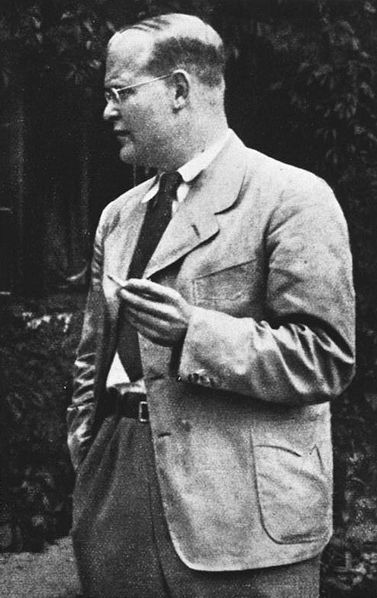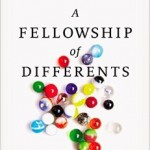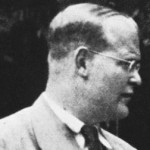 On Sunday, I was not attentive to my schedule and had it sprung on me that it was my turn to give the communion meditation at our church. So, I quickly turned to Dietrich Bonhoeffer’s Life Together, which we are reading in our Sunday School class, and stumbled again upon the following brilliant passage. I share it again here, because all the facets that Bonhoeffer locates in the Eucharist here are central to what John and I are calling Slow Church: gratitude, the centrality of Jesus (I’ll have more to say on this point later this week), the unifying power of eating together, the joy and festivity of being and eating together and the importance of sharing our food.
On Sunday, I was not attentive to my schedule and had it sprung on me that it was my turn to give the communion meditation at our church. So, I quickly turned to Dietrich Bonhoeffer’s Life Together, which we are reading in our Sunday School class, and stumbled again upon the following brilliant passage. I share it again here, because all the facets that Bonhoeffer locates in the Eucharist here are central to what John and I are calling Slow Church: gratitude, the centrality of Jesus (I’ll have more to say on this point later this week), the unifying power of eating together, the joy and festivity of being and eating together and the importance of sharing our food.
—————
Dietrich Bonhoeffer
“The Fellowship of the Table”
Life Together, p. 66-69
Ever since Jesus Christ sat at table with his disciples, the table fellowship of his community has been blessed by his presence. “And it came to pass, as he sat at meat with them, he took bread, and blessed it, and brake, and gave to them. And their eyes were opened, and they knew him” (Luke 24:30-31)
…
To know Jesus Christ in the presence of these gifts—what does this mean?
It means, first, to know him as the giver of all gifts, as the Lord and Creator of this our world, with the Father and the Holy Spirit. The table fellowship therefore, prays, “And let Thy gifts to us be blest,” and thus acknowledges the eternal divinity of Jesus Christ.
Second, the fellowship acknowledges that all earthly gifts are given to it only for Christ’s sake, as this whole world is sustained only for the sake of Jesus Christ, his Word and his message. He is the true bread of life. He is not only the giver but the gift itself, for whose sake all earthly gifts exist. Only because the message concerning Jesus Christ must still go forth and find believers, and because our task is not yet perfected, does God in His patience continue to sustain us with His good gifts. So the Christian table fellowship prays, in Luther’s words: “O Lord God, heavenly Father, bless unto us these Thy gifts, which of Thy tender kindness Thou hast bestowed upon us, through Jesus Christ our Lord. Amen,” thus confessing that Jesus Christ is the divine Mediator and Savior.
Third, the congregation of Jesus believes that its Lord wills to be present when it prays for his presence. So it prays: “Come, Lord Jesus, be our guest” – and thereby confessed the gracious omnipresence of Jesus Christ. Every mealtime fills Christians with gratitude for the living, presence Lord and God, Jesus Christ. Not that they seek any morbid spiritualization of material gifts; on the contrary, Christians, in their wholehearted joy in the good gifts of this physical life, acknowledge their Lord as the true giver of all good gifts; and beyond this, as the true Gift; the true Bread of life itself; and finally, as the One who is calling them to the banquet of the Kingdom of God. So in a singular way, the daily table fellowship binds the Christians to their Lord and one another. At table they know their Lord as the one who breaks bread for them; the eyes of their faith are opened.
The fellowship of the table has a festive quality. It is a constantly recurring reminder in the midst of our everyday work of God’s resting after His work, of the Sabbath as the meaning and goal of the week and its toil. Our life is not only travail and labor, it is also refreshment and joy in the goodness of God. We labor, but God nourished and sustains us. And this is reason for celebrating. Man should not eat the bread of sorrows (Ps. 127:2); rather “eat thy bread with joy” (Ecc. 9:7); “I commended mirth, because a man hath no better thing under the sun, than to eat, and to drink and to be merry” (8:15); but, of course, “who can eat, or who can have enjoyment apart from Him?” (2:25, A.R.V.). It is said of the seventy elders of Israel who went up to Mount Sinai with Moses and Aaron that “they beheld God, and did eat and drink” (Exod. 24:11 A.R.V.). God cannot endure that unfestive, mirthless attitude of ours in which we eat our bread in sorrow, with pretentious, busy haste, or even with shame. Through our daily meals He is calling us to rejoice, to keep holiday in the midst of our working day.
The table fellowship of Christians implies obligation. It is our daily bread that we eat, not my own. We share our bread. Thus we are firmly bound to one another not only in the Spirit but in our whole physical being. The one bread that is given to our fellowship links us together in a firm covenant. Now none dares go hungry as long as another has bread, and he who breaks this fellowship of the physical life also breaks the fellowship of the Spirit. “Deal thy bread to the hungry” (Isa. 58:7) “Make not an hungry soul sorrowful” (Ecclus. 4:2), for the Lord is meeting us in the hungry (Mt. 25:37). “If a brother or sister be naked, and destitute of daily food, and one of you say unto them, Depart in peace, be ye warmed and filled; notwithstanding ye give them not those things which are needful to the body, what doth it profit?” (Jas. 2:15,16). So long as we eat our bread together we shall have sufficient even with the least. Not until one person desires to keep his own bread for himself does hunger ensue. This is a strange divine law. May not the story of the miraculous feeding of the five thousand with two fishes and five loaves have, along with many others, this meaning also?
The fellowship of the table teaches Christians that here they still eat the perishable bread of the earthly pilgrimage. But if they share this bread with one another, they shall also one day receive the imperishable bread together in the Father’s house. “Blessed is he that shall eat bread in the kingdom of God” (Luke 14:15).












